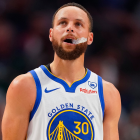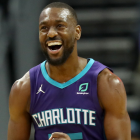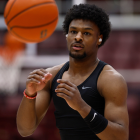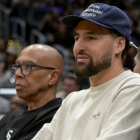The Philadelphia 76ers, a team that won 19 games in 2013-14, 18 games in 2014-15, 10 games in 2015-16 and 28 games in 2016-17, are going to the second round of the NBA playoffs. They eliminated the Miami Heat with a 104-91 win in Game 5 of their first-round series on Tuesday, building on their history-making 17-game winning streak at the end of the regular season.
The Sixers have lost just a single game in the last six weeks. The most exciting part, as coach Brett Brown clearly knows, is that this feels like it is just the beginning.
Miami, meanwhile, is in the place that Philadelphia wanted to avoid: the middle of the pack. The Heat had a good season, but not necessarily a satisfying one. They have some up-and-coming players that can grow with the team, but no surefire superstars. Their future is interesting, but, compared to the Sixers, much more murky.
Here are some takeaways from an exciting, yet overall lopsided (by outcome) series:
Philadelphia proved itself
Short of a sweep, it is hard to imagine the Sixers being more impressive in their first playoff series of the Joel Embiid and Ben Simmons era. They won the opener by 27 points without Embiid. They won Game 4 without having any sort of offensive rhythm for the vast majority of the game. They didn't panic when they lost home-court advantage in Game 2, didn't flinch when Miami dialed up the physicality and didn't once seem fazed by being on a big stage.
"Those guys grew up in this series," Dwyane Wade said. "This is their first playoff. I think they grew up and they learned some things from us and they way we pushed them. And it's just congratulating them. You want to see nothing but good things for those guys -- these [guys] are the future of the NBA. And the NBA is great hands with Ben and Joel."
Simmons, in particular, made a statement in his first postseason. The Heat rarely sped him up or slowed him down. For months, skeptics suggested his reluctance to shoot from the perimeter would bite him in the playoffs. He answered that question emphatically, averaging 18.2 points, 10.6 rebounds, 9.0 assists and 2.4 steals while shooting 50 percent. Rookies are not supposed to do this. There is supposed to be at least some kind of learning curve. Simmons is special.
As a team, Philadelphia held Miami to 101.6 points per 100 possessions, continuing the defensive dominance it displayed in the regular season. As awesome as Simmons' flashy passes, Embiid's dunks and JJ Redick's off-balance 3s are, the Sixers are for real because they are one of the smartest and strongest defensive teams in the league. The Heat, a below-average offensive team in the regular season, could simply not compete with them in the halfcourt.
Philadelphia should be seen as Finals contender
The obvious question for Philadelphia is how far it can go. Relative to preseason expectations, this season was a smashing success before this series even started. But while the Sixers are built for the future, they are talented and cohesive enough to win right now. Regardless of whether or not they face the Celtics or Milwaukee Bucks in the second round, they should be considered the favorites.
Embiid didn't even wait until the end of this series to declare that their time is now. If they are healthy in the conference finals, they will present serious matchup problems for any Eastern Conference opponent. You might feel like it's too early for Philadelphia to get to the NBA Finals, but are you sure that any of these other teams would beat them in a seven-game series? I didn't think so.
Miami mustn't hang its collective head
The Heat are surely frustrated with how this played out. They could have tied the series on Saturday if they had just managed to close the game out. As disappointing as this must feel, though, they did not represent themselves poorly.
Game 2 showed Miami could rebound from a rough loss and Wade still had the ability to take over in crunch time. Game 3 was, considering the circumstances, perhaps the best game of Justise Winslow's life. All series, the Heat played to their identity -- they are aggressive, they are deep and they are tough. Against this opponent, it was just not enough.
"You can lose with effort," Wade said. "You can lose to a better team. And that's what they are. We had some moments we would like to have back. Ultimately they had more than us."
Where do the Heat go from here?
Let's get the big negative out of the way: As soon as the series ended, Hassan Whiteside all but said he wants out. The center wants more playing time and more touches, and it is unclear if Miami is even a little bit interested in giving what he wants. While it is normal for a team's highest-paid player to expect a significant role, it is difficult to excuse the way he has handled his situation. If Whiteside were more engaged defensively on a consistent basis, coach Erik Spoelstra would have certainly rewarded him with big minutes.
Since Whiteside is not the game-changing defensive presence or outside shooter that, say, Embiid is, he often found himself on the bench so the Heat could space the floor and be more versatile. Miami was significantly better with him on the bench than with him on the court in the regular season, and that effect was much more pronounced in this series: In the 77 minutes he played, the Heat were outscored by 15.3 points per 100 possessions.
Whiteside has two years and $48.5 million left on his contract. That will not be easy to move, but Riley's front office must at least try.
- Beyond that, there are several other questions facing Miami:
- Will Wade and Udonis Haslem come back or walk away together?
- Can Wayne Ellington, an unrestricted free agent, be re-signed?
- Can Riley's front office pull off some kind of stunner to bring in a star?
The last question is interesting because it has such a high degree of difficulty. Thanks to long-term investments in Whiteside, Goran Dragic, Tyler Johnson, Dion Waiters, Josh Richardson, James Johnson and Kelly Olynyk, this team is capped out. To make a splash, the Heat have to hope for a situation similar to the one that landed Chris Paul in Houston last summer: A superstar chooses Miami, and then his team works out a deal.
Assuming something like that does not happen, the Heat are sort of stuck. Their salary-cap sheet does not look good on a 44-win team, and, while their player-development program and culture are top-notch, they are trying to do something extremely challenging: go from good to great without bottoming out. Miami has to hope that Winslow, Richardson and Bam Adebayo keep developing and the team can find ways to improve incrementally over the next few years.


















